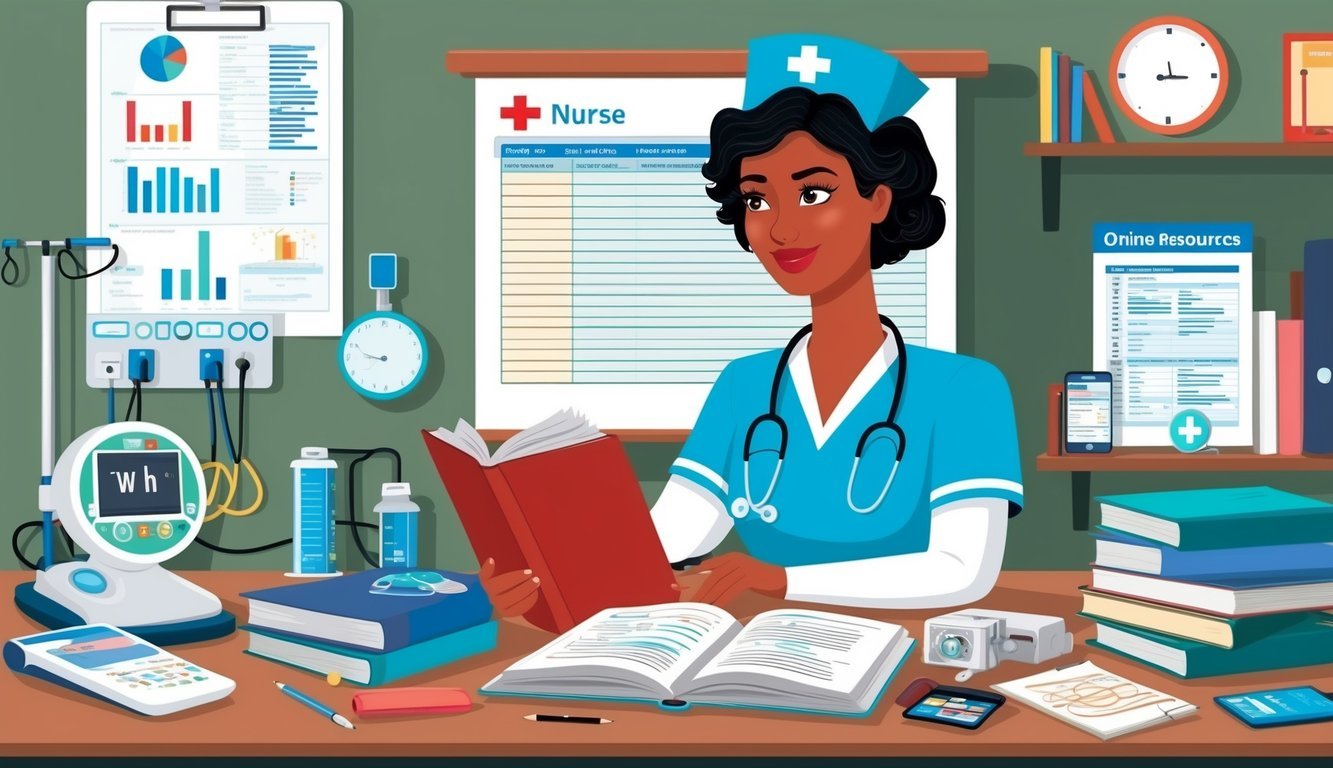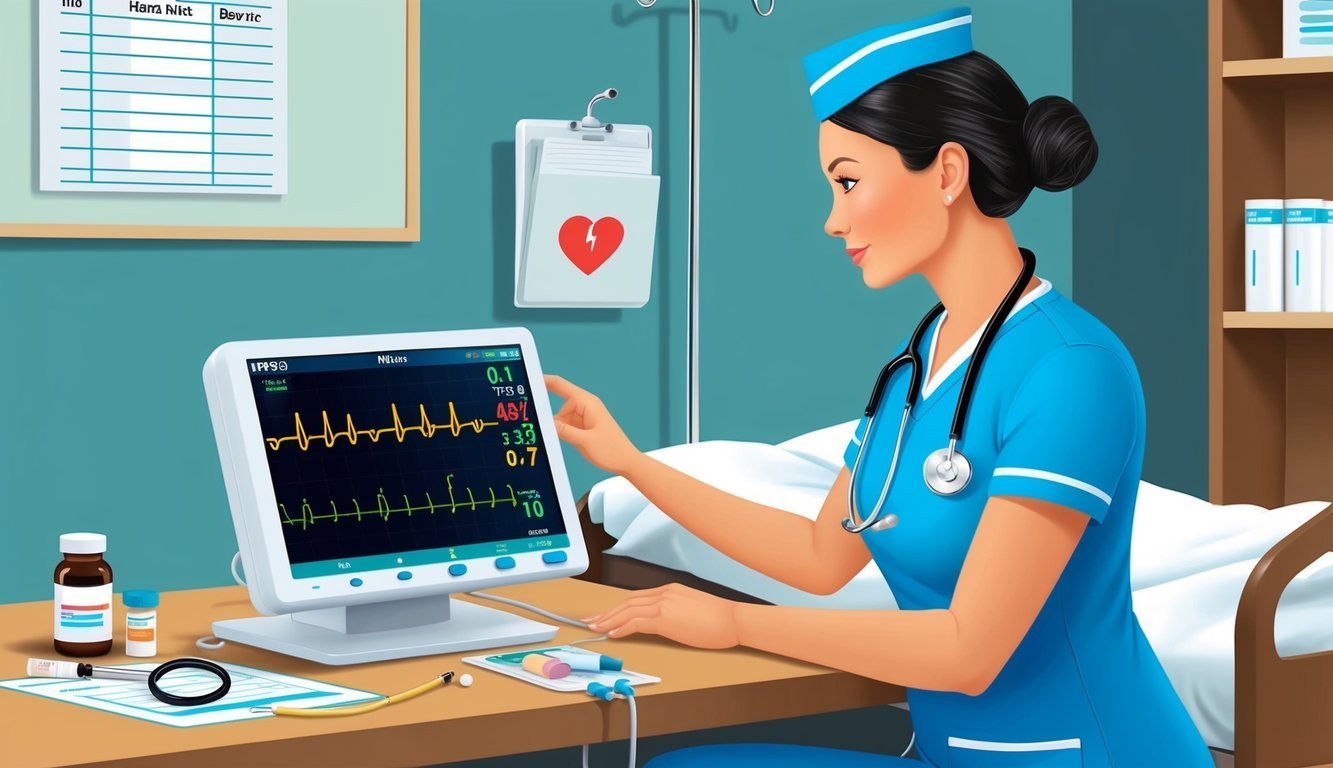Becoming a cardiac nurse is a rewarding career choice, especially for those passionate about heart health.
To start your journey, you need to complete the required education.
This typically includes earning a nursing degree and obtaining licensure.
Cardiac nurses play a vital role in caring for patients with heart conditions, requiring both knowledge and specialized skills.
As you explore this field, you’ll discover various settings where cardiac nurses work, from hospitals to outpatient clinics.
Understanding the employment outlook can also guide your career path, as demand for healthcare professionals continues to rise.
Additionally, acquiring the necessary certifications and gaining experience in clinical skills will help you excel in this dynamic area of nursing.
Your commitment to improving patients’ lives through cardiovascular care is a significant aspect of this profession.
As you move forward, knowing what steps to take will set you on a successful path as a cardiac nurse.
Key Takeaways
- Education and licensure are essential for becoming a cardiac nurse.
- Specialized skills are necessary for working in cardiovascular care.
- Strong job prospects exist in various healthcare settings for cardiac nurses.
Required Education for Cardiac Nurses
To become a cardiac nurse, you need a solid educational background in nursing.
This section covers the various nursing degrees and the options for advanced education.
Understanding Nursing Degrees
You have a couple of pathways to enter the nursing field.
The two main degrees are:
-
Associate Degree in Nursing (ADN): Takes about 2-3 years to complete and allows you to take the NCLEX-RN exam.
-
Bachelor of Science in Nursing (BSN): A 4-year degree that provides more in-depth training and may offer better job prospects.
Graduating from an accredited program is essential, as it ensures quality education.
After completing your degree, passing the NCLEX-RN is necessary to obtain your nursing license.
This is your first step toward becoming a cardiac nurse.
Advancing with a Master’s or Doctoral Degree
Once you have your BSN, consider further education.
Pursuing a Master of Science in Nursing (MSN) can enhance your skills and open doors for specialized roles, including cardiac care.
An MSN typically takes 2 years to complete.
If you aim for even higher qualifications, a Doctor of Nursing Practice (DNP) is an option.
This advanced degree focuses on clinical practice and leadership skills.
It usually requires an additional 3-4 years of study.
Continuing education is important, too.
Certification in cardiovascular nursing can increase your job opportunities and potentially boost your salary.
Regular training keeps you up-to-date with the latest practices and technology in cardiac care.
Licensure and Certification

To work as a cardiac nurse, you must complete specific steps related to licensure and certification.
These include passing the NCLEX-RN for initial licensure and obtaining specialty certifications tailored to cardiac care.
Preparing for the NCLEX-RN
To practice as a registered nurse (RN), you need to pass the NCLEX-RN exam.
This exam assesses your knowledge in various nursing topics, including safety, health promotion, and patient care management.
-
Study Resources: Utilize textbooks, online courses, and practice exams. Many nursing schools offer review classes specifically designed for the NCLEX-RN.
-
Application: You must first apply to your state’s nursing board and meet their requirements. This usually includes submitting your transcripts and completing a criminal background check.
-
Scheduling the Exam: After approval, you can schedule your NCLEX-RN through Pearson VUE. Plan ahead, as seats can fill quickly.
Once you pass this exam, you’ll receive your nursing license, enabling you to pursue positions in cardiac care.
Obtaining Cardiac Nurse Certification
After becoming an RN, pursuing cardiac nursing certification can enhance your career.
Certifications demonstrate your specialized knowledge and skills in this field.
-
Types of Certifications:
- Cardiac Medicine Certification (CMC)
- Cardiac Surgery Certification (CSC)
- Cardiac-Vascular Nursing Certification (CV-BC) offered by the American Nurses Credentialing Center (ANCC).
-
Requirements: Each certification has specific eligibility criteria. Generally, you need to have a valid RN license, work experience in cardiac nursing, and sometimes a certain number of continuing education hours.
-
Exam Preparation: Use study materials and courses specific to your chosen certification. Practice exams can also help you gauge your readiness.
Achieving these certifications can improve your job opportunities and may lead to higher salaries in your cardiac nursing career.
Employment Outlook and Settings

The demand for cardiac nurses is expected to grow as healthcare needs increase.
You will find various opportunities across different healthcare settings, each offering unique responsibilities and experiences.
Roles in Various Health Care Settings
Cardiac nurses work in multiple environments, including:
- Cardiac Intensive Care Units (ICUs): Here, you will care for patients with severe heart conditions, often monitoring vital signs and administering medication.
- Cardiac Catheterization Labs: Nurses in this setting assist with procedures to diagnose and treat heart issues, performing tasks like patient prep and assisting doctors.
- Cardiovascular Centers: These facilities focus on diagnosing and treating heart diseases. Your role may involve patient education and follow-up care.
- Clinics and Home Health: You could provide routine check-ups and education for heart health, ensuring patients manage their conditions at home.
The average salary for cardiac nurses can vary by location and experience but often ranges from $91,524 to $117,000 annually, based on data from BLS and industry sources.
Career Advancement Opportunities
To advance your career as a cardiac nurse, consider obtaining additional certifications.
These may include:
- Cardiac Credentialing: Specializing in certain areas can lead to roles such as a Cardiac Nurse Practitioner or Clinical Nurse Specialist.
- Leadership Positions: With experience, you may qualify for management roles within hospitals or clinics, overseeing teams and improving patient care protocols.
Pursuing continuing education or earning a Master’s degree can also enhance your opportunities.
This investment in your skills can lead to roles in teaching or research, contributing to the future of cardiac care.
Clinical Skills and Competencies
As a cardiac nurse, you will need specific clinical skills and competencies to provide effective patient care.
Your responsibilities will include acute care measures, advanced life support knowledge, and specialized training in cardiology practices.
Acute Care and Emergency Procedures
In critical situations, quick action can save lives.
You must be proficient in cardiopulmonary resuscitation (CPR) and have a solid understanding of basic life support (BLS) procedures.
When facing emergencies, skills include:
- Defibrillation: Correctly using an Automated External Defibrillator (AED).
- Advanced Cardiac Life Support (ACLS): Applying advanced techniques in a cardiac arrest scenario.
- Health Assessments: Performing quick evaluations to determine the urgency of care.
Your ability to maintain clear communication skills during emergencies is vital.
This ensures effective teamwork and swift responses in critical situations.
Specialized Cardiac Knowledge
Having in-depth knowledge of cardiac conditions is crucial for your role.
You should understand various heart diseases, including heart attack and congestive heart failure.
Key areas of focus include:
- Electrocardiograms (EKGs): Interpreting EKG results to identify arrhythmias or other heart issues.
- Postoperative Care: Managing patients after procedures like bypass surgery.
- Treatment Plans: Collaborating to create evidence-based treatment plans tailored to individual patients.
Your role in cardiac rehabilitation involves education on lifestyle changes and medication management.
Continually update your skills through ongoing education and training in nursing skills and critical care practices to ensure high-quality patient care.
Specialized Cardiac Care Areas

In cardiac nursing, specific areas of specialization focus on managing chronic heart conditions and advancing treatment methods.
Understanding these areas is vital for providing high-quality patient care.
Managing Chronic Heart Conditions
As a cardiac care nurse, you will often deal with patients suffering from chronic heart conditions such as heart disease and heart failure.
Your role involves monitoring symptoms, administering medications, and educating patients about lifestyle changes.
Key aspects include:
- Heart Failure Management: Regular assessments to evaluate the effectiveness of treatments and adjust as needed.
- Rehabilitation Programs: These programs help restore patient health through exercise and education.
- Cardiac Catheterization: Assisting in procedures to diagnose and treat coronary artery disease.
Providing emotional support is also essential, as many patients experience anxiety about their conditions.
Advancements in Cardiac Treatments
Cardiovascular nursing continues to evolve with new treatment options and technologies.
Staying updated on these advancements is important for you and your patients.
Some advancements include:
- Angioplasty: A procedure to open narrowed arteries, improving blood flow.
- Stress Test Evaluations: These tests help determine how your patients’ hearts perform under stress.
- Cardiac Intensive Care: Specialized care for critically ill cardiac patients, focusing on monitoring and intervention.
Getting your Cardiovascular Nursing Certification (CVRN) can enhance your understanding of these updates and improve your professional credibility.
Frequently Asked Questions
Becoming a cardiac nurse involves understanding educational requirements, certifications, and job responsibilities.
This section answers common queries about the path to this specialized nursing role.
What are the educational requirements for becoming a cardiac nurse?
To become a cardiac nurse, you must first complete a nursing program.
You can choose between a two-year Associate Degree in Nursing (ADN) or a four-year Bachelor of Science in Nursing (BSN).
Many employers prefer candidates with a BSN due to its comprehensive training.
What certifications are needed to practice as a cardiac nurse?
While certification is not always mandatory, obtaining a cardiovascular nursing certification is recommended.
This certification helps demonstrate your knowledge and expertise in cardiac care, making you a more competitive candidate for jobs.
How long does it typically take to become a cardiac nurse practitioner?
It typically takes 4-6 years to become a cardiac nurse.
This timeframe includes completing your nursing degree and obtaining your RN license.
If you decide to pursue a Master’s degree for further specialization, it may take additional time.
What responsibilities does a cardiac nurse typically have?
Cardiac nurses monitor patients’ heart health and administer medications.
They also assist with diagnostic tests, educate patients about heart health, and develop care plans.
Additionally, they collaborate with doctors and other healthcare professionals.
In what settings do cardiac nurses commonly find employment?
Cardiac nurses often work in various healthcare settings, including hospitals, clinics, and specialized cardiac care centers.
You might also find positions in rehabilitation facilities, outpatient clinics, and home healthcare.
What steps are involved in specializing within cardiac nursing?
To specialize in cardiac nursing, first gain experience in a clinical setting that focuses on cardiac care.
Afterward, consider pursuing additional certifications or an advanced degree to enhance your expertise and career opportunities.

